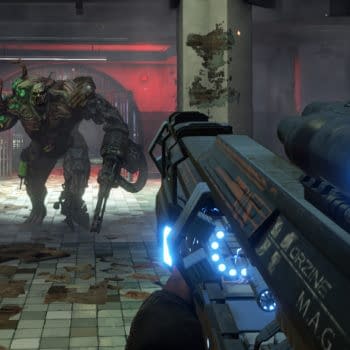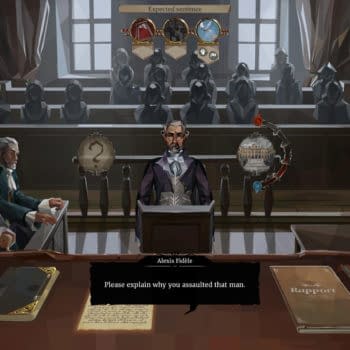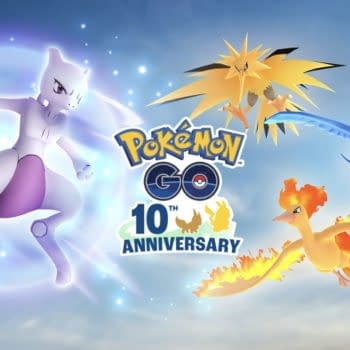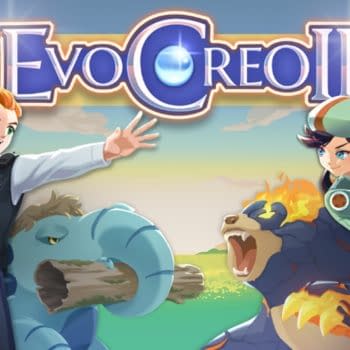Posted in: Games, Video Games | Tagged: Albert Bandura, Brad J Bushman, Craig A Anderson, Guy Comberbatch, video games and gun violence, video games and violence
The Truth About Video Games and Violence According to Science
Video games, movies, and music have all been blamed for causing violence, often times as a reactionary form of censorship. But they've also been used as easy scapegoats for the "reason" behind large-scale acts of violence. Since the dawn of modern psychology, science has been trying to prove a link between violent media and violent action, often to mixed results. Because, if video games and movies are the reason why certain individuals commit massacres, there has to be some way to prove that there is a correlation at the very least.
The easy answer is to just accept that violent media is a scapegoat for the fact that we can't chat about gun violence in America, but that's not going to be particularly conclusive for the folks who feel that yes, video games teach people how to commit mass murder.
At one of my previous jobs I worked in a school. Every year they had someone come in to talk with staff about active shooters and what to do if an active shooter were on the loose in the school. It also came with a drill where we had to hide in our offices, pull in any kids we saw, and hide in the dark after barricading the door. The esteemed former NYPD officer turned school safety adviser sent to talk with us spent a good half hour talking about how games like Doom and Halo were designed to teach people how to go about shooting up masses of civilians. As the resident gamer on staff, I had a whole lot of things to tell that safety adviser about how neither of those games include scenes of humans slaughtering other humans, making Doom and Halo not the best games to use as examples. Call of Duty or America's Army would have been better scapegoats. But that would have been missing his point, so I kept my damn mouth shut, and I sat there while my boss quietly laughed at how much effort it took me to do so.
So while I totally understand the compulsion to sidetrack chats about gaming and violence with facts or to use yourself as a perfectly sane video gamer example, this article is not just going to boil down to "I play video games and am not out there shooting hundreds of people" because that misses the whole point. A sample size of one (or three if I include my fellow BC game writers) proves nothing. The content of the games itself proves nothing.
The idea behind "video games cause gun violence" basically boils down to this: first-person shooters put you in a very visceral position as the perpetrator of violence. And many people have concerns that this position makes you more likely to commit such acts of violence in real life, because you've been conditioned to believe it is acceptable behavior by the video game reward system.
We're going to look into the psychology behind all that and see if it might actually have some shred of truth. So, without futher ado, onto the science!
One of the most famous cases comes from a series of experiments conducted by Albert Bandura in the 1960s using violent adult models and bobo dolls. Children were exposed to scenes of adults committing acts of violence, then placed in a room with the bobo dolls and a series of weapons. Many of the children re-enacted what they'd seen and committed acts of violence on the dolls. Of course, the bobo doll experiment was designed to try and rule out any inherent bias by creating three different groups of children — one control group and two experimental.
You can check out this video of Bandura explaining the studies, alongside video taken during the experiments. The evidence seems kind of damning right?
Except the study fails to account for one of the very best ways that children learn: roleplaying. Bandura was even a champion of the Social Learning Theory, which stated that kids learn by practicing behavior they've seen in adults. Kids learn best by doing, and like any good brain sponge, kids model behavior that they see. Now, no one is going to argue that letting your 7-year-old child play America's Army is a great idea, but simulated violence on a doll could have a ton of other uses rather than just increasing violent tendencies. In fact, Bandura's conclusion of the bobo doll experiments was actually that the findings supported his Social Learning Theory, though his study did concede that it had some interesting implications about the effects of media violence on children.
What Bandura's experiment cannot account for is the fact that imitation of violence on a doll after being directly exposed to media violence does not prove anything long-term about aggression modelling. It's not like Bandura followed these children for their entire lives seeing which kept hold of the violent "lessons" they learned during the study. Which then brings up questions of ethics, but we're going to skip over that minefield for now.
Many psychologists are critical of imitation studies because they have a "low ecological validity" because the situation created with the bobo dolls is not one children are likely to experience very often. It involves a child and an adult model, with no interaction between the child and the model at any point, and the child has no chance to influence the model in any way. They are also strangers. Most often children model behavior seen in their parents and adults that they trust.
Then there's the fact that all of the children in Bandura's studies were children of Standford University Psychology staff and students. Like many universities in the 1960s, Standford was an excessively white, upper class campus. So those three groups of children were hardly representative of the general US population at all.
A later study by Guy Cumberbatch in 1990 found that children who had not previously played with a bobo doll before were five times as likely to imitate aggressive behavior than those who were familiar with the doll. I can't say I blame those kids, because bobo dolls are pretty damn creepy. This also falls in line with what we know about violence and dehumanization. The less something seems human and therefore less worthy of empathy, the more likely we are to be okay with hurting it.

Moving away from the bobo doll experiments, we find a lot of research, specifically about the effects of violent video games, coming from Craig A. Anderson and Brad J. Bushman, who I've previously noted have axes to grind on the subject. Anderson has taken research money from anti-video game groups, while Bushman's work mostly hinges upon the idea that catharsis is useless. However, they are far from the only ones to discuss the effects of violent video games on aggressive behavior.
As the New York Times reported back in 2013:
"None of these extreme acts, like a school shooting, occurs because of only one risk factor; there are many factors, including feeling socially isolated, being bullied, and so on," said Craig A. Anderson, a psychologist at Iowa State University. "But if you look at the literature, I think it's clear that violent media is one factor; it's not the largest factor, but it's also not the smallest."
Most researchers in the field agree with Dr. Anderson, but not all of them. Some studies done in schools or elsewhere have found that it is aggressive children who are the most likely to be drawn to violent video games in the first place; they are self-selected to be in more schoolyard conflicts. And some studies are not able to control for outside factors, like family situation or mood problems.
"This is a pool of research that, so far, has not been very well done," said Christopher J. Ferguson, associate professor of psychology and criminal justice at Texas A&M International University and a critic of the field whose own research has found no link. "I look at it and I can't say what it means."
And indeed, looking at every study we could get our hands on, we find even more studies that come with mixed results or that have obvious factors that confound their results, much like Ferguson argued above. So far, science has not been able to prove a direct link between violent media and violent outbursts.
In fact, research actually indicates that it is creative writing assignments that are more likely to be a tell than any kind of extra-curricular activities. This shouldn't come as much of a surprise to anyone who has ever been involved in the process of creating anything. Our projects, our art, often reveal more of ourselves than anything else we do. So of course the writing, art, and self-expression of troubled individuals is a much better indicator of potential violence than games. Sure, you could argue like this latest Op-Ed in the NY Times that the problem with video game violence is gamer culture, but that doesn't signify. While gamer culture has a reputation for being caustic and hostile to women, people of color, the disabled, and LGBTQ+ individuals, all that information comes from anecdotes. And every gamer has plenty of anecdotes that go the other way as well — which makes it worth nothing.
But let's not forget the borader cultural significance of this debate. Because if science doesn't have a clear answer, there has to be something else at work here.
Because in truth, the media and violence debate really goes back to one of the earliest forms of entertainment: the theater. One of the best examples from history comes to us thanks to the Jacobean dramas in the English playhouses. Following the reign of Queen Elizabeth I and the tradition of Elizabethan Drama, we have the works produced by playwrights under the leadership of King James I. Much like Elizabethan Drama, Jacobean Drama had its particular characteristics, which boiled down to characters perpetrating crimes and acts of violence in the pursuit of their ambitions. Even Shakespeare got well into the proper swing of Jacobean Drama, with his later tragedies depicting torture on-stage. The rise of the Puritan movement in England was the death knell for English Renaissance theatre, as the Puritans were hostile toward drama and performance art, as they felt that "entertainment" was sinful.
And as anyone over the age of five can tell you, it was the Puritans who started the colonization of America. And early Puritan America was not fond of entertainment, to say the very least. You can actually trace that thread of extreme artistic censorship through the course of American history. Granted, that censorship was not always religiously based, but often political. And we'd see periods of artistic freedom followed by incredibly strict artistic suppression have helped shape the course of human history. Propaganda takes the form of art — literature, games, movies, even memes — as a way to invade the thoughts of a given population. Of course, this whole debate rages all over the western world. We're focusing on America here because, well, it's the Americans with the major problem with gun violence and our administration that are currently blaming video games for it rather than examining their lax gun policies.
One of the easiest examples is The Red Scare of the late 1940s and 1950s, which put all of America on a Hollywood witch hunt, trying to ferret out communist sympathizers in Tineseltown. That conflict became immortalized in Arthur Miller's The Crucible. While Miller's play takes place during the Salem Witch Trials of 1692 and 1693, the impetus for his play and for the "wrongly accused" protagonist John Proctor was the House Un-American Activities Committee, which was run by the zealous Joseph McCarthy. The era of McCarthyism ran from 1945 all the way through 1975, and much of the fear of the era was reflected in the movies being put out at the time. 2015's docudrama Trumbo chronicles the life of screenwriter Dalton Trumbo as he worked to write despite being put on the Hollywood Blacklist.
Now, if you actually look at many of the films produced during the Red Scare (and even prior to that), much of it was very, very left-leaning and pro-communist. Partly that was pushback against McCarthy's anti-Hollywood agenda, but some of it was very real sentiment. There were communists in Hollywood. But those messages, despite being devoured by a ravenous public, were very quickly lost as public opinion turned "communism" into a dirty word post World War II. What Americans call Communism, political scientists call Fascism and Totalitarianism. In fact, all three systems of government are incredibly different but often conflated in the public sphere often because of specific political agendas. But Communism became the anti-American buzzword and it hasn't recovered at all.
You can see the effects of censorship and propaganda even now. Many have blamed the results of the 2016 election on the use of "fake news" propagated by memes. Meanwhile, any news source critical of the current President is discredited as "fake news" despite any third-party assessment of the actual content of their programming. Meanwhile every single form of entertainment has some kind of political agenda. It's simply the way that art works. Art exists as a reaction to the current state of affairs, thus all art takes some kind of a stance. And while I'd like to say that the video game community is immune to this, no art form is free from politics. After all, there are many white supremacists in the games communities. Steam has several communities of them. And that's not even touching the white savior themes of many video games, including the Far Cry series. And there are as many gamers and game developers on the opposite side of the political spectrum.
Plus, gaming is a worldwide industry. Plenty of countries enjoy violent video games but don't have the same problem with mass murder. Saying that video games cause violence is an easy, and cheap, way to derail any proper discussion about gun control in the United States. It's a politically loaded statement that, well, doesn't have much of a basis in actual proven science. But then, that isn't the point. The point is to distract people, to keep the status quo because it works for those in power to keep things as they are. And blaming easy targets is something we love to do as a country. It might as well be the third Great American Pastime after baseball and racism.
So the truth is, video games don't cause you to be any more violent than you were before encountering them. The whole argument is smoke and mirrors, trying to pin the blame for a very American problem on a worldwide entertainment industry simply because it's the newest thing.






![[REVIEW] "Gang Beasts" is Zany Party Madness](https://mlpnk72yciwc.i.optimole.com/cqhiHLc.IIZS~2ef73/w:350/h:350/q:75/rt:fill/g:ce/https://bleedingcool.com/wp-content/uploads/2019/09/gang-beasts-7-350x350.jpg)




![[REVIEW] "Divinity: Original Sin II" Definitive Edition is Almost Perfect](https://mlpnk72yciwc.i.optimole.com/cqhiHLc.IIZS~2ef73/w:350/h:350/q:75/rt:fill/g:ce/https://bleedingcool.com/wp-content/uploads/2018/08/Divinity-Original-Sin-2-Definitive-Edition-art-350x350.jpg)





